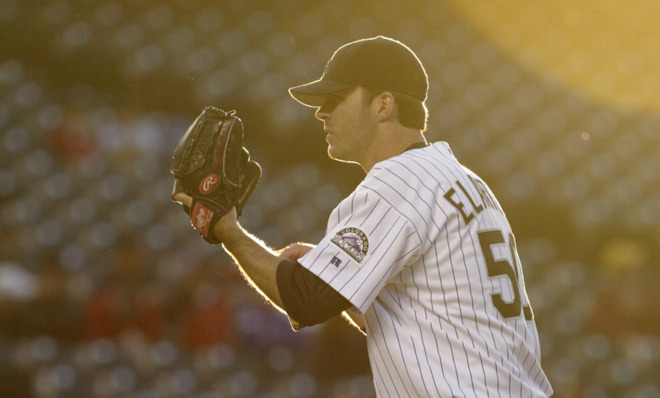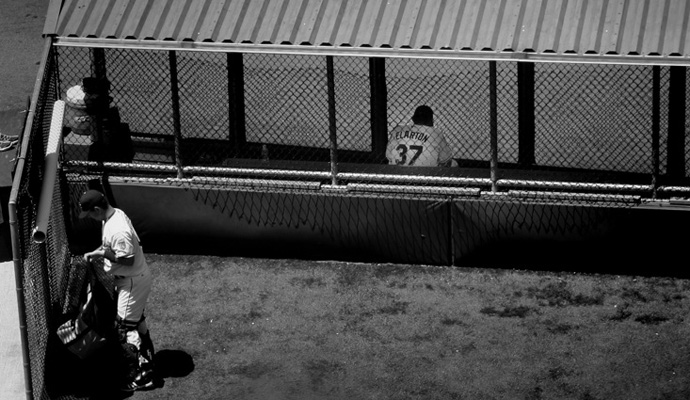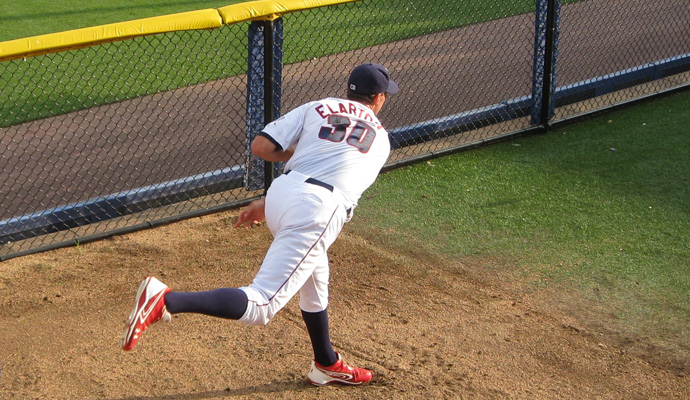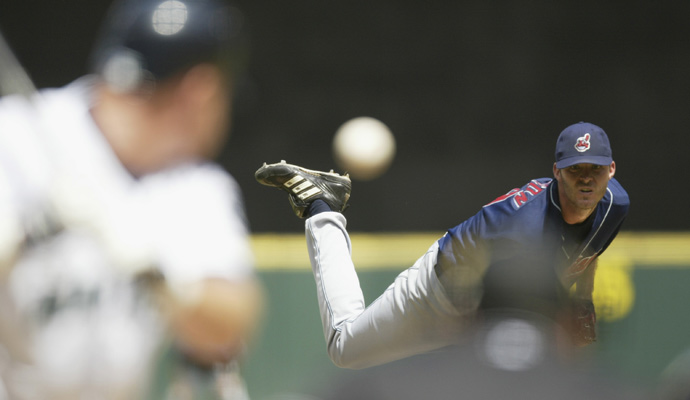What it's like to go back to the minors
For veteran baseball players like Scott Elarton, a comeback requires a return to the minor leagues

A free daily email with the biggest news stories of the day – and the best features from TheWeek.com
You are now subscribed
Your newsletter sign-up was successful
Even though he had been out of baseball for most of four years, Scott Elarton felt completely comfortable walking into the Phillies' clubhouse in February 2012. Many of the players had no idea who he was because professional athletes' memories rarely extend back more than about 15 minutes. In baseball world 2012, Cal Ripken Jr. — who retired in 2001 — is an old-timer who played in a lot of games, Willie Mays is a distant memory, and Babe Ruth is the name of a league for teenage players.
Elarton had won 56 games as a major-league pitcher in spite of numerous injuries, including 17 for a bad Houston Astros team in 2000. But he hadn't been in a major-league baseball clubhouse since 2008 and even though he stood out at 6-foot-7, a lot of players had no idea who he was.
"It's not like anybody looked at me and thought I was some hotshot prospect," he said with a laugh. "I probably look every bit of 36."
The Week
Escape your echo chamber. Get the facts behind the news, plus analysis from multiple perspectives.

Sign up for The Week's Free Newsletters
From our morning news briefing to a weekly Good News Newsletter, get the best of The Week delivered directly to your inbox.
From our morning news briefing to a weekly Good News Newsletter, get the best of The Week delivered directly to your inbox.
Seven months earlier, even Rubén Amaro Jr., the Phillies' general manager, hadn't recognized Elarton. That was in August, when Elarton had called to him while standing on the field during batting practice prior to a game between the Phillies and the Colorado Rockies. Elarton was watching BP with his 7-year-old son when he noticed Amaro standing a few yards away and, on a complete whim, decided to try to talk to him.
After Elarton had introduced himself and introduced his son, he said something to Amaro that surprised him — even as he spoke. To this day, he isn't quite certain why the words came out of his mouth.
"Rubén, do you think there's any chance I could make a comeback in baseball?" he said. "Do you think I could pitch again?"
To Elarton's surprise, Amaro didn't answer him with a response along the lines of "Are you insane?" or even a polite blowoff. Instead, he shrugged his shoulders and said, "If you'd like, I'll send someone to watch you throw once the season's over."
A free daily email with the biggest news stories of the day – and the best features from TheWeek.com
Elarton couldn't ask for more than that. Amaro gave him his card, and they shook hands, leaving Elarton standing there wondering what in the world he had just gotten himself into.
As it turned out, Amaro was as good as his word.
Elarton had gone home to Lamar, Colorado, the town of just under 8,000 where he had grown up, and had begun throwing on a regular basis with Josh Bard, a former major-league catcher who lived nearby. He wasn't counting on a call from Amaro, but he wanted to be ready just in case. He could feel the adrenaline each time he threw to Bard, and as the season wound down, he began to believe — "maybe just a little bit" — that he wasn't entirely crazy.

Shortly after the World Series ended, Amaro called. He was going to be in Denver for a banquet in which Shane Victorino, then with the Phillies, was scheduled to receive an award. If Elarton was still interested and could make the drive to Denver, he would watch him throw the morning after the banquet.
Elarton and Bard made the drive early on a November morning, and Amaro met them at a local school.
Amaro had him throw about 50 pitches in all. Elarton thought Amaro would tell him that he'd be in touch. That would leave him with some hope.
Amaro didn't do that. "I'd like to sign you," he said. "If you give me your agent's information, I'll get in touch and we'll work out a deal."
Four months after that meeting, Elarton walked into the spacious clubhouse at Bright House Field and found a crisp, clean uniform with the number 59 on it hanging in a locker that had his name on it. A number of veteran players, guys he had pitched against in his first baseball incarnation, came by to say hello and welcome him.
"If you've been a player, a baseball clubhouse is a very comfortable place to be if you're in uniform," he said. "Even if you haven't been around for a while, if you're in uniform, then you feel like you belong. If you're not in uniform, then you don't. It really doesn't matter who you are or who you've been, that's the way it is."
Players talk often about the fear of someday not having a uniform or a locker anymore. Elarton had taken that a step further when he had shown up in Denver as a "civilian," as players call anyone not in uniform. Putting on a uniform again, even surrounded by so many unfamiliar faces, was comforting.
He arrived in Clearwater, Fla., with a simple goal: pitch so well during spring training that it would be impossible for the Phillies to send him down.
"Realistically, there weren't any spots open — especially for a starter," he said. "All you had to do was look at the rotation and you knew there wasn't any chance. They had stars and veterans. I hadn't pitched, except for three starts in Charlotte in 2010, since 2008. Intellectually, I knew the deal. But as a competitor I was going there to show them I was still a major-league pitcher. If I didn't think I was good enough, there wasn't much point in my being there."
The first three times Elarton got into games, he showed them. When he was on the mound facing real hitters, it all came back like riding a bike. His unorthodox delivery, all arms and legs coming at the batter from his 6-foot-7-inch frame, had hitters who hadn't seen him before way off balance.

"First three times I pitched I didn't have to pitch from the stretch once," he said, smiling at the memory. "It almost felt like I was back in Houston and it was 2000 again."
That was the year Elarton won 17 games pitching for the Astros before injuries and a taste for the nightlife sent his promising career off the rails. Twelve years later, back in the March heat of Florida's west coast, he was 25 again. He could tell by the looks he was getting from his teammates in the clubhouse that they were noticing.
And then, not surprisingly, he came back to earth. It wasn't as if he crashed; he descended more slowly than that, pitching reasonably well but not lights out the way it had been at the start of camp. As March came to a close, he knew the numbers he had been concerned about in February were clearly stacked against him. Nevertheless, with a week left before the team broke camp, he was still on the roster.
"I was in early one morning to work out before I was supposed to throw," he said. "I was on a bike when [pitching coach] Rich Dubee came in. I said, 'Hey, Rich, what time am I supposed to throw this morning?' He just looked at me and said, 'Need to talk to you in Charlie's office.'"
Charlie Manuel was the Phillies' manager. Elarton knew he wasn't being invited in for breakfast. "In baseball there are two reasons you get called into a major-league manager's office, and both are bad," Elarton said. "The first one is if you're being taken out of the rotation — or benched. That's not good. The second one is a lot worse."
This was the second one. Rubén Amaro was sitting with Manuel when Elarton walked in, a clear sign of what was to come — if Elarton had needed one. Both men were very complimentary about Elarton's spring: He had worked hard, done everything they had asked. They believed he was capable of pitching in the big leagues again if he could improve his command. (A pitching term that, in English, means being able to throw pitches to the exact spot where a pitcher wants them. Missing by an inch can be the difference between a swing and a miss and a line drive.) But as he knew, the team was blessed with starters like Roy Halladay, Cliff Lee, and Cole Hamels — not to mention guys like Joe Blanton and Vance Worley who weren't stars but had solid big-league résumés.
Manuel finished with the inevitable line ballplayers have been hearing for as long as the minor leagues have existed. "Go down and keep working hard and there's a good chance you'll be back up here. It's a long season."
Elarton was disappointed, though not surprised, yet also elated. He had gone from standing behind a barrier trying to wave Amaro down the previous August to being on the cusp of making a big-league roster seven months later. He knew Manuel's words — although clichéd — were true: It was a long season, and if he pitched well in Triple-A, there was a chance he would make it to Philadelphia. He believed he was good enough.
He thanked Amaro and Manuel for the chance they had given him and packed up his locker to move across the complex to the minor-league camp. The walk from the big-league clubhouse to the minor-league clubhouse took only a few minutes, but it was as if Elarton had traveled through time and space to another dimension.

Baseball players understand that no one goes straight to the big leagues. Once upon a time, an occasional player might bypass the minor leagues either because of extraordinary talent or because a team needed instant publicity. Nowadays, no one does that — even phenoms like Stephen Strasburg, Bryce Harper, and Mike Trout spend some time in the minor leagues.
But they all assume that their journey will go in only one direction — up. They all believe that once they walk out of a minor-league clubhouse heading for the big leagues, they aren't coming back. Of course many do come back. Some end up on an escalator that takes them up and down to the point where they feel dizzy.
Scott Elarton had ridden the escalator, particularly near the end of his first baseball incarnation — even dropping briefly back to Double-A at one point. "You rationalize it by saying it wouldn't have happened if you hadn't been hurt," he said. "But after a while it doesn't matter. You look around and there are plenty of guys who have been hurt, plenty of pitchers who have had shoulder surgery more than once.
"You want to think you're going to wake up one morning and you're going to be 25 and your shoulder is going to be completely healthy. Then you wake up and realize that's never going to be the case again. One morning I woke up and decided it was time to go home."
That is...until that summer afternoon in Denver, standing behind a barrier with his son, when he decided it was time to try again — one more time.
And so, on this late March morning in Clearwater, Elarton stood for a long moment and looked around the packed minor-league clubhouse. Then he took a deep breath and went to find his locker. No one even looked up at him. He was another face in the crowd. He was back where nobody knows your name.
Excerpted from Where Nobody Knows Your Name with permission from 2014 by John Feinstein. All rights reserved.


